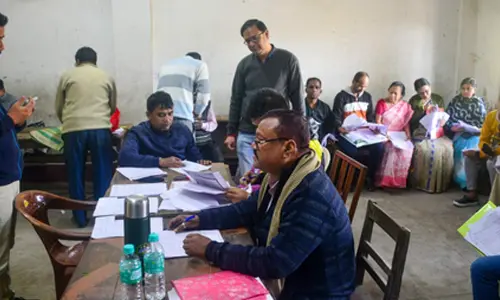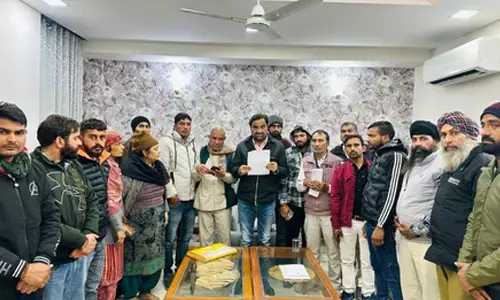Denial of ACR breaches Article 14

The Annual Confidential Report (ACR) system is an old system started in the 1940s but is still used in the public sector organizations of many middle- and low-income countries (MLICs) such as India, Swaziland (Africa), and Sri Lanka.
The Annual Confidential Report (ACR) system is an old system started in the 1940s but is still used in the public sector organizations of many middle- and low-income countries (MLICs) such as India, Swaziland (Africa), and Sri Lanka.
(McCourt W, Eldridge W. Global human resource management: managing people in developing and transitional countries. Cheltenham: Edward Elgar, UK; 2003, referred to in https://www.ncbi.nlm.nih.gov/ pmc/articles/PMC4890281).
Natural justice includes right to represent against adverse remarks and seek review of the same, Supreme Court said in a landmark judgment. All of those employees who were adversely remarked by their superiors might be at a serious disadvantage and injustice or differential treatment.There is no remedy available for such employees are still in service, or retired, if their old ACRs (annual confidential reports) contain any adverse remarks and their career is affected by it. Administrators need to address it
Literature suggests that the appraisal systems or the ACR in civil services has been found to be ineffective and does not contribute to employees’ learning and development as the ACR system has communication gaps with personal biasness and lack of employees’ participation (Stafyarakis M, Eldridge D. HRD and performance management. MSc in Human Resource Development Reading 5. IDPM University of Manchester; 2002 quoted in https://www.ncbi.nlm.nih.gov/ pmc/articles/PMC4890281/).
The Supreme Court in Vijay Kumar vs. State of Maharashtra & Ors. 1988 (Supp) SCC 674 held that an un-communicated adverse report should not form the foundation to deny the benefits to a government servant when similar benefits are extended to his juniors. The Supreme Court in another case State of Gujarat & Anr. vs. Suryakant Chunilal Shah 1999 (1) SCC 529 stated:
"Purpose of adverse entries is primarily to forewarn the government servant to mend his ways and to improve his performance.
That is why, it is required to communicate the adverse entries so that the government servant to whom the adverse entry is given, may have either opportunity to explain his conduct so as to show that the adverse entry was wholly uncalled for, or to silently brood over the matter and on being convinced that his previous conduct justified such an entry, to improve his performance".
Supreme Court in Dev Dutt v Union of India and others (2008)8 SCC 725 (https://indiankanoon.org /doc/801705/) held: “In our opinion every entry must be communicated to the employee concerned, so that he may have an opportunity of making a representation against it if he is aggrieved”.
The two-judge bench speaking through Justice Markandeya Katju, held as follows:
It is well settled that no rule or government instruction can violate Article 14 (equality before law) or any other provision of the Constitution, as the Constitution is the highest law of the land.
The … Office Memorandum, if it is interpreted to mean that only adverse entries are to be communicated to the concerned employee and not other entries, would in our opinion become arbitrary and hence illegal being violative of Article 14.
All similar Rules/Government Orders/Office Memoranda, in respect of all services under the State, whether civil, judicial, police, or other service (except the military), will hence also be illegal and are therefore liable to be ignored.
The Supreme Court explained how the ACRs and non-communication of same to the affected party will reflect arbitrariness, as follows:
It has been held in Maneka Gandhi vs. Union of India & Anr. AIR 1978 SC 597 that arbitrariness violates Article 14 of the Constitution.
In our opinion, the non-communication of an entry in the A.C.R. of a public servant is arbitrary because it deprives the concerned employee from making a representation against it and praying for its up-gradation.
In our opinion, every entry in the Annual Confidential Report of every employee under the State, whether he is in civil, judicial, police or other service (except the military) must be communicated to him, so as to enable him to make a representation against it, because non-communication deprives the employee of the opportunity of making a representation against it which may affect his chances of being promoted (or get some other benefits).
Moreover, the object of writing the confidential report and making entries in them is to give an opportunity to a public servant to improve his performance, vide State of UP vs. Yamuna Shankar Misra 1997 (4) SCC. Hence such non-communication is, in our opinion, arbitrary and hence violative of Article 14 of the Constitution.
The Apex Court established a norm that every remark, good or bad, in annual confidential report should be communicated to the concerned employee.
It explained:14. In our opinion, every entry (and not merely a poor or adverse entry) relating to an employee under the State or an instrumentality of the State, whether in civil, judicial, police or other service (except the military) must be communicated to him, within a reasonable period, and it makes no difference whether there is a bench mark or not.
Even if there is no bench mark, non-communication of an entry may adversely affect the employee's chances of promotion (or getting some other benefit), because when comparative merit is being considered for promotion (or some other benefit) a person having a `good' or `average' or `fair' entry certainly has less chances of being selected than a person having a `very good' or `outstanding' entry.
When the adverse remarks or less than ‘best’ appreciation will affect the career of the employee, the natural justice demands the disclosure and review mechanism. It is an important transparency measure which will totally transform the relationship between superiors and the subordinate employees.
Transparency in public administration requires all entries in ACR must be accessible to affected employee. The Supreme Court developed the principles of natural justice.
39. In the present case, we are developing the principles of natural justice by holding that fairness and transparency in public administration requires that all entries (whether poor, fair, average, good or very good) in the Annual Confidential Report of a public servant, whether in civil, judicial, police or any other State service (except the military), must be communicated to him within a reasonable period so that he can make a representation for its upgradation.
This in our opinion is the correct legal position even though there may be no Rule/G.O. requiring communication of the entry, or even if there is a Rule/G.O. prohibiting it, because the principle of non-arbitrariness in State action as envisaged by Article 14 of the Constitution in our opinion requires such communication. Article 14 will override all rules or government orders.
Natural justice includes right to represent against adverse remarks and seek review of the same. This is a landmark judgment by the Supreme Court which ended the slavery for ACR. Prior to this the Information Commissions gave different contradictory judgments regarding disclosability of ACRs under RTI Act.
Government Employees online portal http://www.gconnect.in/orders-in-brief/acr-apar/annual-performance-appraisal-report-dopt-instructions.html, gave following frequently asked questions and answers on APAR:
a)Since when the entire remarks in the APAR is being conveyed to the officer reported upon for representation, if any? Answer — From the report for 2008-09 onwards.
b)On the basis of representation submitted for upgrading the grading in the ACR/APAR under OM dated 13.4.2010, can a review DPC be convened if the Competent Authority upgrades the grading to the benchmark level? Answer — The O.M. No. 21011/1/2010-Estt.A dated 13.4.2010 does not envisage any review DPC and it is concerned with future DPCs only to be held after the date of issue of the O.M.
c)What are the time schedules for completion of various processes in the APAR? Answer— Annexure—III to O.M. No. 21011/1/2005-Estt. (A) (Pt-II) dated 23rd July, 2009 refers. This O.M. is available in this Department’s website. Source: http://persmin.gov.in
This is the most significant change in the functioning of pubic authorities brought by the vibrant employees challenging the adverse ACR remarks through RTI and PILs.
However, the change will not be applicable before 2008 and will not help the appellant to secure any remedy for adverse remarks in ACR for years 2001 to 2004.
All of those employees who were adversely remarked by their superiors might be at a serious disadvantage and injustice or differential treatment.
There is no remedy available for such employees are still in service, or retired, if their old ACRs contain any adverse remarks and their career is affected by it.
Administrators need to address it. (Based on decision on 1.11.2016 in Y K Mall, Lucknow v. PIO, KVS, Delhi, CIC/CC/A/2015/002083-SA) Madabhushi Sridhar
Also Read:
Right of retired employee & RTI
Two issues show the inefficiency in the system– non-filling of the vacancies and not giving pension and other benefits on the day of retirement...Click here to read the full post
Registered bodies in India bound by RTI
The origin, lofty ideals, objective, mission and ethos of the Council for Indian School Certificate Examinations mandates it to be transparent, accountable and answerable... Click here to read the full post
Quality education for all
Equality in accessing quality education is a fundamental right under Article 14 read with Right to life under Article 21... Click here to read the full post














